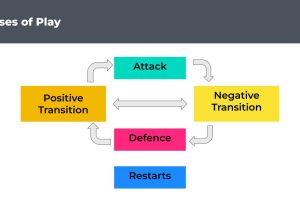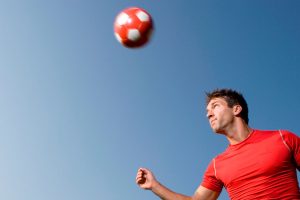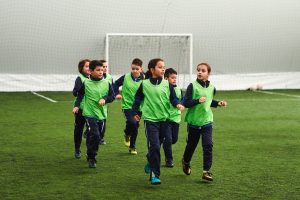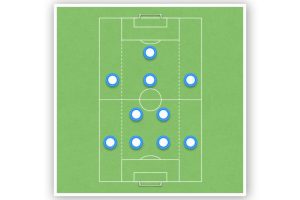What is Deliberate Practice in Soccer: A Comprehensive Guide
Deliberate practice is a well-known concept in the world of sports, and soccer is no exception. It is a systematic approach to training that involves intense, focused, and repetitive practice of specific skills, tactics, or techniques. The goal is to improve performance and achieve mastery of the sport.
Deliberate practice is not just about putting in the hours of practice, but also about the quality of practice. It involves breaking down complex skills into smaller, manageable parts, and focusing on improving each part until it becomes automatic. It also involves receiving feedback from coaches, teammates, or video analysis, and using that feedback to make adjustments and improvements.
In soccer, deliberate practice can take many forms, such as practicing specific moves, working on ball control, or practicing set pieces. It is also important to practice game-like situations, such as one-on-one drills or small-sided games, to simulate the pressure and intensity of real matches.
What is Deliberate Practice?
Deliberate practice is a purposeful and systematic approach to skill development that involves focusing on specific areas of improvement to achieve expertise. It is a method used by top performers across a wide range of fields, including sports, music, and business.
Definition
Deliberate practice is often confused with regular practice, which involves mindless repetitions. However, deliberate practice requires focused attention and is conducted with the specific goal of improving performance. It involves breaking down complex skills into smaller components and working on each component until it is mastered.
Purposeful Practice
Purposeful practice is an essential component of deliberate practice. It involves setting specific goals, receiving feedback, and focusing on areas of weakness. Purposeful practice is not just about repeating the same task over and over again. It is about pushing oneself outside of one’s comfort zone and constantly challenging oneself to improve.
Expertise
Deliberate practice is a key factor in developing expertise. It involves hours of focused, purposeful practice, often over a period of many years. Through deliberate practice, individuals can develop the skills and knowledge necessary to become experts in their field.
Talent Development
Deliberate practice is also a critical component of talent development. While some individuals may have a natural talent for a particular skill, deliberate practice is necessary to develop that talent to its full potential. Through deliberate practice, individuals can identify areas of weakness and work to improve them, ultimately becoming top performers in their field.
Why is Deliberate Practice Important in Soccer?
Improving Performance
Deliberate practice is a key factor in improving performance in soccer. By engaging in highly structured activities that are specific to the sport, players can focus on specific goals and see significant improvement in their skills and abilities. Through deliberate practice, players can identify their weaknesses and work to improve them, leading to better overall performance on the field.
Expert Coaches
Expert coaches are an important component of deliberate practice in soccer. Coaches who understand the importance of deliberate practice and have experience in designing effective training sessions can help players achieve their full potential. These coaches can provide guidance on proper technique, offer feedback on performance, and create challenging drills that push players to improve.
Types of Practice
There are several different types of practice that can be used in deliberate practice for soccer. One common type is blocked practice, where players repeat the same skill or drill over and over until they have mastered it. Another type is random practice, where players switch between different skills or drills to keep their minds and bodies engaged. Variable practice is another type, where players practice the same skill in different contexts to improve their ability to adapt to different game situations.
Overall, deliberate practice is an essential component of becoming a successful soccer player. By focusing on specific goals, working with expert coaches, and engaging in different types of practice, players can improve their skills and abilities and perform at their best on the field.
Anders Ericsson’s Theory of Deliberate Practice
Anders Ericsson, a psychologist and scholar on the topic of expertise, introduced the concept of deliberate practice in his research paper titled “The Role of Deliberate Practice in the Acquisition of Expert Performance.” Deliberate practice is an approach to improving performance and attaining expert performance in a specific field, such as soccer.
The Role of Commitment
According to Ericsson, deliberate practice requires commitment to consistently engage in activities that challenge an individual’s current abilities. It involves setting specific goals and focusing on improving weaknesses through targeted practice. In the context of soccer, a committed player will set goals to improve their dribbling, passing, shooting, and other skills through deliberate practice.
Opportunity and Constraints
Ericsson also emphasizes the importance of opportunity and constraints in deliberate practice. Opportunity refers to the availability of resources and support to engage in deliberate practice, such as access to a coach or training facilities. Constraints, on the other hand, are limitations that may affect the quality and quantity of deliberate practice, such as time constraints or financial limitations.
Practice Hours
Another crucial aspect of deliberate practice is the number of practice hours. Ericsson suggests that deliberate practice requires a significant amount of time, often several hours a day, to achieve expert performance. However, it is important to note that the quality of practice is just as important as the quantity. Deliberate practice involves focused attention and repetition of specific skills, rather than mindless repetition of the same activity.
The Science Behind Deliberate Practice
Myelin and Skill Development
Deliberate practice is a method of skill development that involves focused and repetitive training with the goal of improving performance. The science behind deliberate practice lies in the concept of myelin, a fatty substance that wraps around nerve fibers in the brain and spinal cord. Myelin is essential for neural communication and plays a critical role in skill acquisition and development.
Research has shown that deliberate practice can lead to changes in the brain’s myelin structure and increase the speed and accuracy of neural transmissions. This means that deliberate practice can help athletes develop and refine the neural pathways required for specific skills, ultimately leading to improved performance.
Deliberate Play vs. Deliberate Practice
While deliberate practice is focused and systematic, deliberate play is unstructured and self-led. Deliberate play involves games and activities that are highly enjoyable and use rules adapted from the adult form, typically monitored by the athletes themselves. While deliberate play can be beneficial for developing creativity and enjoyment of the sport, it is not as effective as deliberate practice for improving specific skills.
Deliberate practice requires focused attention and is conducted with the specific goal of improving performance. It involves breaking down skills into smaller components, practicing each component individually, and then integrating them back into the whole skill. This process of breaking down and rebuilding skills allows athletes to identify and correct errors, leading to more efficient and effective skill acquisition.
Sampling and Specialization
Another important aspect of deliberate practice is the balance between sampling and specialization. Sampling involves trying a variety of sports and activities, while specialization involves focusing on one sport or activity. While early specialization can lead to initial success, research suggests that sampling can lead to long-term success and enjoyment of the sport.
Deliberate practice can be applied to both sampling and specialization. For athletes who specialize in a particular sport, deliberate practice can help them refine and improve their skills. For athletes who sample a variety of sports and activities, deliberate practice can help them identify and develop skills that transfer across different sports.
Overall, the science behind deliberate practice suggests that this method of skill development can lead to significant improvements in performance. By focusing on specific skills, breaking them down into smaller components, and practicing them with deliberate attention, athletes can develop and refine the neural pathways required for success in their sport.
Daniel Coyle’s Insights on Deliberate Practice
Daniel Coyle, the author of “The Talent Code,” is a well-known expert on the topic of deliberate practice. According to Coyle, deliberate practice is not just about putting in the hours of practice, but it’s about practicing with a specific focus and intention to improve a particular skill.
Coyle believes that deliberate practice involves pushing oneself out of their comfort zone and constantly challenging oneself to improve. He suggests that it’s important to break down the skill into smaller components and practice each component separately. This allows the individual to focus on the weaker areas of their skill set and improve them.
Coyle also emphasizes the importance of feedback in deliberate practice. He suggests that it’s crucial to have a coach or mentor who can provide constructive feedback and help the individual identify areas for improvement.
Another key aspect of deliberate practice, according to Coyle, is repetition. He suggests that repeating the same skill over and over again helps to build the neural pathways in the brain and create muscle memory. This, in turn, allows the individual to perform the skill automatically and with greater efficiency.
Overall, Coyle’s insights on deliberate practice emphasize the importance of focused, intentional practice and the role of feedback and repetition in skill development. By breaking down skills into smaller components, pushing oneself out of their comfort zone, and seeking feedback from a coach or mentor, individuals can improve their skills and achieve mastery in their chosen field.
Conclusion
Deliberate practice is a crucial aspect of soccer development that can help players achieve their goals. By focusing on specific skills and techniques, players can improve their performance and reach their full potential. Experts in the field of soccer development emphasize the importance of deliberate practice in creating a deliberate environment that fosters growth and development.
Deliberate practice involves purposeful and systematic training that focuses on specific areas of improvement. It requires players to engage in activities that challenge them and push them beyond their comfort zones. By doing so, players can develop their skills and abilities and become more effective on the field.
While genes may play a role in determining a player’s potential, deliberate practice can help players overcome genetic limitations and reach their full potential. By engaging in deliberate practice activities, players can improve their technique, speed, agility, and other aspects of their game.
Play activities can also be a valuable tool in the development of soccer players. By engaging in fun and challenging games, players can develop their skills and abilities in a more enjoyable and engaging way. However, it is important to ensure that play activities are designed to promote deliberate practice and not just for the sake of having fun.
In conclusion, deliberate practice is a critical component of soccer development. By focusing on specific areas of improvement and engaging in purposeful and systematic training, players can improve their performance and reach their full potential. With the right training and support, players can achieve their goals and become successful soccer players.








